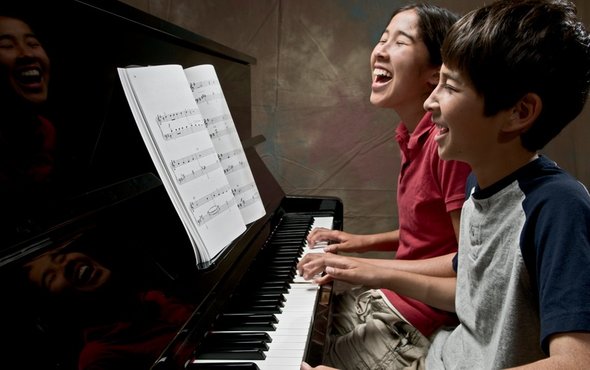(单词翻译:单击)
听力文本
This is Scientific American — 60-Second Science. I'm Christopher Intagliata.
Musicians are said to have better language skills. And scientific studies have backed that up. But it's not clear why that might be the case.
Now a study of 74 Chinese kindergartners suggests six months of piano lessons can heighten the brain's response to changes in pitch. And kids who got piano lessons were also better at telling apart two similar-sounding Mandarin words, which contained different consonants, than were students who got extra reading training, or who went through regular kindergarten.
The results are in the Proceedings of the National Academy of Sciences.
Now Mandarin is a tonal language—the famous example is the word 'ma' which can mean mother or horse depending on its pitch. So might musical training translate better to Mandarin, than, say, English?

"Yeah it's possible that influenced the results." Robert Desimone, a neuroscientist at the McGovern Institute at MIT. But he says other studies do back up the fact that music lessons benefit language learners, even in countries without tonal languages. "And what our study added on top of that was some idea of the neural basis for those benefits."
And if you don't own a piano, don't despair. The reading group actually did just as good on many measures as the piano group. "Reading's pretty good actually. We don't mean to downplay reading instruction."
More important, he says, was to show piano wasn't actually worse than reading for these skills... perhaps encouraging cash-strapped schools to keep their music programs alive.
Thanks for listening for Scientific American — 60-Second Science. I'm Christopher Intagliata.
参考译文
这里是科学美国人——60秒科学。我是克里斯托弗·因塔利亚塔。
音乐家被认为拥有更好的语言技能。科学研究也证实了这种观点。但目前尚不清楚原因。
现在,一项对中国74名幼儿园儿童展开的研究显示,上6个月的钢琴课可以增强大脑对音高变化的反应。上过钢琴课的孩子在分辨两个发音相似且包含不同辅音的汉语词汇时,其表现要优于那些接受过额外阅读训练或在普通幼儿园上学的孩子。
这项研究结果发表在《美国国家科学院院刊》上。
汉语普通话是一种声调语言,著名的例子是“ma”这个词因音高不同,可意为“妈妈”或“马”。那么,说普通话者经受音乐训练的效果比说英语者的效果更好吗?
“是的,结果有可能被影响。”麻省理工学院麦戈文研究所的神经学家罗伯特·德西蒙尼说到。但他说,其他研究也证实了“音乐课有益于语言学习者”这一事实,即使在没有声调语言的国家也是如此。“除此之外,我们的研究还补充了一些有关这些益处的神经基础概念。”
如果你没有钢琴,也不要灰心。阅读组在很多方面的表现都和钢琴组一样出色。“阅读的确有很多益处。我们没有贬低阅读教学的意思。”
他说,更重要的是,研究结果表明就提高这些技能来说,钢琴训练的表现并不比阅读练习差,或许这能鼓励那些资金紧张的学校保留音乐课。
谢谢大家收听科学美国人——60秒科学。我是克里斯托弗·因塔利亚塔。
译文为可可英语翻译,未经授权请勿转载!
重点讲解
重点讲解:
1. back up 支持,证实(某种说法);
Radio signals received from the galaxy's centre back up the black hole theory.
从该星系中心收到的无线电信号证实了黑洞理论。
2. tell apart 区分;区别;辨别;
It's difficult to tell them apart.
很难把他们区分开来。
3. on top of 另外;加之;除…之外(还);
On top of that, I've got one extra bit of good news I think you might want to hear.
除此之外,我还有一个你想要听到的好消息。
4. encourage sb. to do sth. 鼓励;激励;
Relocation expenses were paid to encourage senior staff to move to the region.
公司发放了安置费来鼓励高级员工搬到这个地区。


